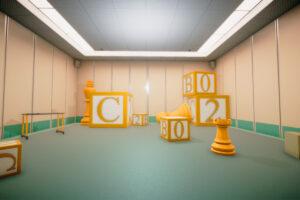I played Superliminal created by Pillow Castle Games. I played on the Nintendo Switch but it’s also available on Steam, Xbox, PS4, and Epic Games. Superliminal is a first-person puzzle game that forces players to navigate their way through several room puzzles where they realize that things are actually exactly how they seem. This is a game for people who like thrillers, and puzzles, and are slightly terrified of a jumpscare at all times.

Mechanics and Experience
Forced perspective is the main mechanic of the game. You are able to manipulate objects by scaling them up or down based on your perspective, which you can then use to get to new heights, enter rooms, and more. This mechanic MAKES the experience — combined with optical illusions, it creates several new puzzles for the user to solve over the course of each level. I think by trying to figure out how to use the mechanic to solve the puzzle in each level really makes you think, and therefore is a key influence on one’s experience of the game. I did not pick it up as fast as other players but found that it was still a very exciting novel mechanic to play with. It’s also a little creepy, like why are there random chess pawns and giant dice in each room? Why can I enter certain rooms but objects not? That, combined with the fact that no one else was there, added to the sense of something being very wrong with the environment.

Formal Elements
You are a participant in a dream therapy program but seem to be trapped in recurring loops where you are continuously forced to solve puzzles in new dream environments. Your objective is to escape with the help of Dr. Glenn Pierce, the program’s creator. You’re a player against the game, more specifically the system and AI assistant who is holding you in the dream environment. Some basic outcomes I noticed were that sometimes when you finished a puzzle, you’d be able to unlock a piece of dialogue or maybe even move on to the next level to see a whole new environment. Honestly, I felt a lot of personal pride whenever I solved a puzzle! I also observed several rules and procedures, like in manipulating objects you have to interact with them, but you can’t bring objects into certain rooms. The boundary of the game is uncertain. You’re in a dream set (like a movie set), but you’re also able to explore the area around it that seems abandoned with dusty boxes and soda machines. The overarching boundary seems to be the dream itself.
Types of Fun
I argue Superliminal caters to several types of fun, including challenge, sensation, discovery, and narrative. I found that Superliminal definitely met its goal in each, detailed below.
Challenge: Each level holds new obstacles which the players overcome with new creative uses of forced perspective. Kinda the point of a puzzle game, right? I’m not a huge puzzle person so I gave up a few times before I came back to a certain puzzle to try and solve it like I would solve a coding problem or write a really long essay.
Sensation: I found that I was on edge for the entirety of the time I played the game — the game created a sense of unease and tension to the point where I almost felt like I was playing a horror game or watching a psychological thriller. There’s a Backrooms vibe to it too. The use of long hallways and classical music created the feeling of everything being fake but also extremely real at the same time. I also found that the use of creepy dialogue that was short and robotic also contributed to the feeling. Spooky.
Discovery: I think that discovering how the game’s narrative worked alongside the mechanics was one of the most immersive aspects of the game. I was super uneasy, but I kept striving forward to find the next object I could use and how exactly I could use it. Discovering new uses of the mechanics was a new experience in every room.
Narrative: I had only played all the puzzles in the first level, but found that I was more and more intrigued by what exactly was happening. At the end of one level, the narrator (who seemed to be an AI assistant) said she was not part of my patient care team and very specifically that she “did not care”. I think that was the first time in the game when I realized not everything in the simulation was on my side (my assumption coming in), which made me feel even more on edge than I already was! To keep the player confused yet interested enough to keep playing and find out was something I noticed felt very well done.

Signing off,
Annabelle



